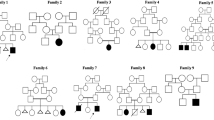Abstract
There are numerous causes, such as environmental factors, medications, endocrine disorders, and genetic factors, that can lead to obesity. However, severe early-onset obesity with abnormal feeding behavior, mental retardation, dysmorphic features, organ-specific developmental abnormalities, and endocrine disorders suggest a genetic etiology. Mutations in genes related to the leptin-melanocortin pathway play a key role in genetic obesity. This pathway controls hypothalamic regulation of food intake. A few cases have been reported to have mutations in leptin (LEP) or leptin receptor (LEPR) genes. The cases had severe early-onset obesity, hyperphagia, and additional features, such as altered immune function, hypogonadism, and hypothyroidism. We present a 3-year-old male patient with severe early-onset obesity whose genetic analysis revealed a homozygous, novel, and pathogenic variant (c.1603+2T>C) in LEPR.


Similar content being viewed by others
References
Styne DM et al (2017) Pediatric obesity-assessment, treatment, and prevention: an Endocrine Society Clinical Practice guideline. J Clin Endocrinol Metab 102(3):709–757
Kaur Y et al (2017) A systematic review of genetic syndromes with obesity. Obes Rev 18(6):603–634
Casazza K, Pate R, Allison DB (2013) Myths, presumptions, and facts about obesity. N Engl J Med 368(23):2236–2237
Goldstone AP, Beales PL (2008) Genetic obesity syndromes. Front Horm Res 36:37–60
Farooqi IS and O'Rahilly S (2000) The genetics of obesity in humans. In: De Groot LJ, et al. (Eds) Endotext. South Dartmouth (MA)
Farooqi IS, O'Rahilly S (2014) 20 years of leptin: human disorders of leptin action. J Endocrinol 223(1):T63–T70
Tartaglia LA et al (1995) Identification and expression cloning of a leptin receptor, OB-R. Cell 83(7):1263–1271
Nunziata A et al (2019) Functional and phenotypic characteristics of human leptin receptor mutations. J Endocr Soc 3(1):27–41
Chua SC Jr et al (1997) Fine structure of the murine leptin receptor gene: splice site suppression is required to form two alternatively spliced transcripts. Genomics 45(2):264–270
Clement K et al (1998) A mutation in the human leptin receptor gene causes obesity and pituitary dysfunction. Nature 392(6674):398–401
Farooqi IS et al (2007) Clinical and molecular genetic spectrum of congenital deficiency of the leptin receptor. N Engl J Med 356(3):237–247
Mazen I et al (2011) Homozygosity for a novel missense mutation in the leptin receptor gene (P316T) in two Egyptian cousins with severe early onset obesity. Mol Genet Metab 102(4):461–464
Huvenne H et al (2015) Seven novel deleterious LEPR mutations found in early-onset obesity: a DeltaExon6-8 shared by subjects from Reunion Island, France, suggests a founder effect. J Clin Endocrinol Metab 100(5):E757–E766
Saeed S et al (2014) Novel LEPR mutations in obese Pakistani children identified by PCR-based enrichment and next generation sequencing. Obesity (Silver Spring) 22(4):1112–1117
Clement K et al (2018) MC4R agonism promotes durable weight loss in patients with leptin receptor deficiency. Nat Med 24(5):551–555
Collet TH et al (2017) Evaluation of a melanocortin-4 receptor (MC4R) agonist (Setmelanotide) in MC4R deficiency. Mol Metab 6(10):1321–1329
Hofmann B (2013) Bariatric surgery for obese children and adolescents: a review of the moral challenges. BMC Med Ethics 14:18
Andiran N, Celik N, Andiran F (2011) Homozygosity for two missense mutations in the leptin receptor gene (P316:W646C) in a Turkmenian girl with severe early-onset obesity. J Pediatr Endocrinol Metab 24(11–12):1043–1045
Le Beyec J et al (2013) Homozygous leptin receptor mutation due to uniparental disomy of chromosome 1: response to bariatric surgery. J Clin Endocrinol Metab 98(2):E397–E402
Vauthier V et al (2012) Homozygous deletion of an 80 kb region comprising part of DNAJC6 and LEPR genes on chromosome 1P31.3 is associated with early onset obesity, mental retardation and epilepsy. Mol Genet Metab 106(3):345–350
Saeed S et al (2015) Genetic variants in LEP, LEPR, and MC4R explain 30% of severe obesity in children from a consanguineous population. Obesity (Silver Spring) 23(8):1687–1695
Kleinendorst L, van Haelst MM, van den Akker ELT (2017) Young girl with severe early-onset obesity and hyperphagia. BMJ Case Rep 2017
Kakar N et al (2013) Exon skipping and severe childhood-onset obesity caused by a leptin receptor mutation. Am J Med Genet A 161A(10):2672–2674
Lenders CM et al (2011) Practical approaches to the treatment of severe pediatric obesity. Pediatr Clin N Am 58(6):1425–1438 x-xi
Acknowledgments
We would like to express our gratitude to the patient’s parents for their understanding and cooperation in this study.
Author information
Authors and Affiliations
Contributions
All authors have accepted responsibility for the entire content of this submitted manuscript and approved submission.
Corresponding author
Ethics declarations
Competing interests
Informed consent was obtained from the parents of the case included in this report.
Additional information
Publisher’s note
Springer Nature remains neutral with regard to jurisdictional claims in published maps and institutional affiliations.
Rights and permissions
About this article
Cite this article
Armağan, C., Yılmaz, C., Koç, A. et al. A toddler with a novel LEPR mutation. Hormones 18, 237–240 (2019). https://doi.org/10.1007/s42000-019-00097-6
Received:
Accepted:
Published:
Issue Date:
DOI: https://doi.org/10.1007/s42000-019-00097-6




